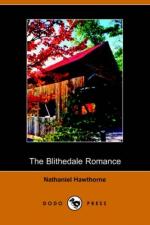To be sure, our next neighbors pretended to be incredulous as to our real proficiency in the business which we had taken in hand. They told slanderous fables about our inability to yoke our own oxen, or to drive them afield when yoked, or to release the poor brutes from their conjugal bond at nightfall. They had the face to say, too, that the cows laughed at our awkwardness at milking-time, and invariably kicked over the pails; partly in consequence of our putting the stool on the wrong side, and partly because, taking offence at the whisking of their tails, we were in the habit of holding these natural fly-flappers with one hand and milking with the other. They further averred that we hoed up whole acres of Indian corn and other crops, and drew the earth carefully about the weeds; and that we raised five hundred tufts of burdock, mistaking them for cabbages; and that by dint of unskilful planting few of our seeds ever came up at all, or, if they did come up, it was stern-foremost; and that we spent the better part of the month of June in reversing a field of beans, which had thrust themselves out of the ground in this unseemly way. They quoted it as nothing more than an ordinary occurrence for one or other of us to crop off two or three fingers, of a morning, by our clumsy use of the hay-cutter. Finally, and as an ultimate catastrophe, these mendacious rogues circulated a report that we communitarians were exterminated, to the last man, by severing ourselves asunder with the sweep of our own scythes! and that the world had lost nothing by this little accident.
But this was pure envy and malice on the part of the neighboring farmers. The peril of our new way of life was not lest we should fail in becoming practical agriculturists, but that we should probably cease to be anything else. While our enterprise lay all in theory, we had pleased ourselves with delectable visions of the spiritualization of labor. It was to be our form of prayer and ceremonial of worship. Each stroke of the hoe was to uncover some aromatic root of wisdom, heretofore hidden from the sun. Pausing in the field, to let the wind exhale the moisture from our foreheads, we were to look upward, and catch glimpses into the far-off soul of truth. In this point of view, matters did not turn out quite so well as we anticipated. It is very true that, sometimes, gazing casually around me, out of the midst of my toil, I used to discern a richer picturesqueness in the visible scene of earth and sky. There was, at such moments, a novelty, an unwonted aspect, on the face of Nature, as if she had been taken by surprise and seen at unawares, with no opportunity to put off her real look, and assume the mask with which she mysteriously hides herself from mortals. But this was all. The clods of earth, which we so constantly belabored and turned over and over, were never etherealized into thought. Our thoughts, on the contrary, were fast becoming cloddish. Our labor symbolized nothing, and left us mentally sluggish in the dusk of the evening. Intellectual activity is incompatible with any large amount of bodily exercise. The yeoman and the scholar—the yeoman and the man of finest moral culture, though not the man of sturdiest sense and integrity—are two distinct individuals, and can never be melted or welded into one substance.




